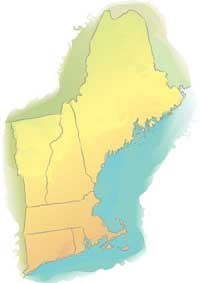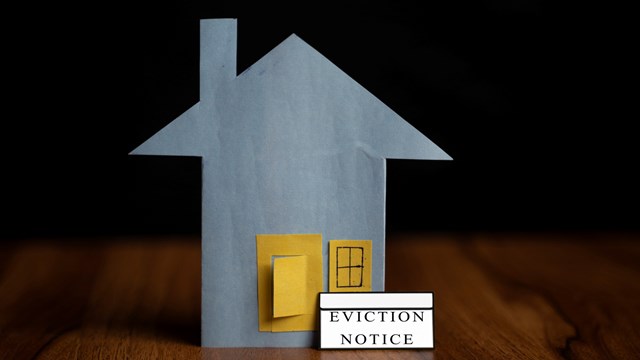
With New England condominiums still grappling with the recent economic downturn, it’s no accident that most new state condo legislation deals with money matters. From a proposed superlien law in New Hampshire that would put condos first in line to collect unpaid condo fees, to a Rhode Island bill that makes it easier for condos to borrow for repairs, helping the condominium’s bottom line is a prevailing theme of new condo legislation. A state-by-state breakdown of current legislation finds most legislatures sympathetic to the problems of condominiums.
Hoping to follow in the footsteps of other states that have enacted superlien laws, a newly amended HB 1340 is halfway there in New Hampshire: as of this writing, the bill has passed in the House and is on its way to the Senate.
If passed and signed by Governor John Lynch, condo associations could file priority liens that take precedence over first mortgage holders (typically banks).
“When individuals don’t pay their share, the whole group must make up for the lack. We’re hoping that this will cause banks to put some pressure on delinquent unit owners. In turn, thebill may help associations keep their reserves more stable, stabilize funding ebbs and flows, and keep property values up for all unit owners,” says state Rep. William Infantine (R-13, Hillsborough), the bill’s sponsor.
If passed, the law will only take effect for new mortgages as of January 2011 – because the New Hampshire State Constitution does not allow interference with existing contracts. The law will not have such an immediate effect as it does in other states, but eventually its influence will spread. As Infantine explains, “Condominium owners are generally a more mobile group,” referring to data that show roughly 2,400 to 2,600 condominiums change hands per year, while the average mortgage lasts about three to five years between actual sales and refinances.
Maine’s 2009 legislative attempt to get a superlien law failed, and the more recent passage of a mediation provision to the state’s foreclosure statute only adds further injury to associations already struggling under the weight of increased foreclosures triggered by the slumping economy.
Under the statute, condo associations have always had the right to foreclose – independently from the bank – against unit owners who have not been paying their monthly assessments. Thisnew provision retains that right but has added a mediation requirement to the standard court process, both for banks and condo associations that initiate foreclosures.
According to Joseph Carleton, a Wells, Maine attorney and co-chair of the Community Association Institute’sMaine Legislative Action Committee, “We think it’s not appropriate for the law to cover associations.” (Carleton cautions that the law is somewhat vague and there is a small chance the foreclosure provision doesn’t cover condominiums, but he’s advising all his community association clients to act as if it does.)
“The foreclosure process on its own takes one to two years to complete,” explains Carleton, principal of Joseph Carleton, Attorney at Law. “It’s a very lengthy and a very expensive endeavor. This new amendment now makes it even more expensive and time-consuming, and most condominium associations have neither the monetary resources nor the experience to do this.”
“Banks have much greater financial strength,” Carleton continues. “They have trained professionals on staff to deal with mediation, whereas associations are made up of volunteers. This provision will be much more burdensome to associations.”
Though they are only in the early planning stages, the state of Massachu-setts’ Department of Environmental Protection’s (DEP) proposed stormwatermanagement regulations have condominium advocates brewing. And it’s because of this swift and concerned reaction that the DEP has agreed to delay the regulations’ implementation until further studies can be made.
The proposed regulations aim to require “private owners of large impervious surfaces” – which presentlyinclude institutions, commercial, industrial, and residential properties (condominiums) – “to manage storm-water,” or adopt a variety of practices and install devices to reduce pollution and the volume of water runoff.
On paper, the proposed standards for compliance seem straightforward enough. Private property owners of impervious surfaces totaling five or more acres (this includes parking lots and roofs) would be required to implement“good housekeeping practices” such as regular parking lot sweeping. New developments or redevelopments of this size would have to adhere to stricter standards, such as the installation of infiltration basins and rain gardens.
In designated “critical areas,” such as the Charles River watershed and otherlisted lake watershed areas, private property owners of two or more acres of impervious surface will be subject to even more stringent requirements.
In reality, says Matthew Gaines, a CAI-New England Legislative Action Committee member, “There is an awfullot of gray area within these proposed regulations. If there is a redesign or a redevelopment, regulations get more stringent and therefore more costly. And eventually, all that falls on the shoulders of the unit owners and increased assessments,” says Gaines, an associate with Marcus, Errico, Emmer & Brooks, PC, in Braintree, Massachusetts.
In addition to concerns about increasing the financial burden on condominium associations, Gaines and others feel that such regulations shouldn’t apply to condominiums. “The idea that condominiums be treated as the equivalent of single-family homes is always of great concern to us. Suddenlyit seems that the DEP is putting condominium associations – even the small ones – under the same scrutiny as such larger institutions like colleges and hospitals.”
The bottom line, says Gaines, is that“there are still too many questions to be answered. Doing something that is beneficial to the environment is a good thing – but it really has to be more carefully thought out.”
Passed in November of 2009 and now in effect, House Bill 5906 has made several positive changes to RhodeIsland’s condominium law.
One feature of the bill makes it easier for condominiums to borrow funds from a bank, by allowing them to use future monthly unit owner payments as collateral for loans. Theseloans could be used as an alternative to large, one-time assessments for needed capital repair projects.
“It’s a way to generate revenue,” explains Frank Lombardi, a member of the CAI-New England Legislative Action Committee, and an attorney with Goodman, Shapiro & Lombardi, LLC, in Dedham, Massachusetts, and Providence, Rhode Island.
The law couldn’t come at a better time, says Lombardi. “All those condominiums built in the 1980s are getting old and the big repairs are now due: new siding, new roof, new windows. These could cost hundreds of thousands of dollars, and most associations don’t have this kind of money in the reserves. It doesn’t make sense to suddenly pass that cost on to owners through increased assessments – it makes sense to borrow the money and pay it off over time.”
Another provision of the new bill requires unincorporated condominiums to file a certificate containing the names and contact information of their board members with their town or city each year. In the past, says Lombardi, “These unincorporated associations were below the radar: no one knew anything about them. The banks don’t know who they are; the bankruptcy courts don’t know. This is important because any time there is an interface between a third party and an association, you need to know who to deal with.”
Currently in its very early stages of review, pending legislation would make it easier for unit owners to make changes to their own dwellings without having to seek a 100 percent unit owner vote, as long as abutters approved and changes correspond with general bylaws.
The Connecticut General Assembly recently enacted a number of revisions to the Common Interest Ownership Act (CIOA), effective July 1, that have associations scrambling and strugglingfor compliance. Calling the changes “decent and livable, but not ideal,” attorney and chair of CAI-CT Legislative Action Committee Scott Sandler explains the new rules.
“It’s important that people understand why these changes have happened,” says Sandler, who is with Perlstein, Sandler & McCracken, LLC, in Farmington, Connecticut. “The original draft was based on the theory that associations were trying to hide things from unit owners and operating in secret.” Whilehe is quick to point out that this perception is not the norm, especially in Connecticut, the changes enacted should put to rest any misgivings.
New requirements have been made with a focus on keeping association business as transparent as possible. Boards must now have open meetings (even though most condominium bylaws already state this) and all meetings must allow for an open forum to receive comments from unit owners. Also new is the mandatory advance notification of meetings that would include a copy of the agenda and made available to all unit owners and board members.
“All of this sounds great on paper,” says Sandler, “but it can be hard to accommodate. On-site room to house all possible unit owners is often not available; and coordinating schedulingwith advance notice of meetings can also be difficult.”
There is a plan to help iron out the wrinkles and make the transitions run more smoothly. “We (the CT chapter of CAI) are trying to collect data to see how associations are responding and to determine the problems over the next few months. Then we can go back to the legislature and make general recommendations. It’s a work in progress.” Stay tuned.
Another issue facing Connecticut condominium associations and one that Sandler feels very strongly about is SB 129, which would create an Office of Condominium Ombudsman, currently under consideration by the state legislature. The way it is drafted, a newly-created condo ombudsman would receive complaints from unit owners against the association regarding alleged violations of state laws or condominium bylaws.
“This bill is structured in a very unbalanced way,” Sandler charges. “It allows unit owners to make complaints, but not associations. It only goes one way.” The bill requires a unit owner to pay a $35 filing fee for the complaint, which the ombudsman will then determine if it is valid. If so, then the association has to pay a fine of $35 with the possibility of an additional $100 if not paid within 30 days, even when a violation has not been actually proven.
“This bill is requiring associations to pay in order to defend themselves,” says Sandler. “This notion is contrary to public policy and contrary to our American system of jurisprudence.”
Under normal circumstances, explains Sandler, the cost of litigation serves as a filter for claims that are unlikely to be successful. This bill, he warns, will only open the door to all sorts of claims that would normally go nowhere. “You’re giving the power of a state agency to do all the legwork for a complaint for only $35: If you have one owner that wants to create trouble for its association, that person can now incur thousands of dollars worth of legal fees that other unit owners will have to bear. It can get very expensive.”
“I’m not so naïve to think that there aren’t secretive or abusive associations out there, but unit owners do generally have a great deal of power and influence,” he says. And, the recent provisions to the CIOA (see above) give even greater validation to that notion. “Associations are perfectly capable of effectively dealing both with complaintsthat have merit and those that don’t. They are making mountains out of mole hills.”
Sandler also points out that the legislature is looking for a way to fund the ombudsman position through an annual fee to the association. “The association will be paying for it in one way or another. There is a line drawn in the mental sand: the association versus the unit owners. What the governmentdoesn’t seem to understand is that the association and the unit owners are one and the same.”
Making its way through the current legislative session is H.482, a bill seeking to make some changes to the Vermont Common Interest Ownership Act. The bill, as it is written, will eliminate the statutory lien for fines charged to a unit owner, while “allowing the statutory lien to continue for condominium assessment charges, late charges, and interest.” It also requires associations to notify a unit owner of a lien at least 30 days prior to foreclosure and to provide the amount of unpaid assessments. Significantly, “failure to provide the required notice prohibits the association from filing a foreclosure action against the unit.” Finally, the bill also states that the association must “discharge the lien within 30 days after the unit owner pays the unpaid assessments, and notify the unit owner of the discharge within ten days when accomplished.” Failure to comply would result in a civil liability against the association of up to $5,000 in damages.
“Our main concern was that notification be given,” says State Representative Charles Bohi (D-White River Junction), one of the original sponsors of the bill. “While I don’t think that government should be micromanaging associations, I think this kind of information shouldbe transparent and readily available. Everyone involved should know exactly what’s going on.”
Laura V. Scheel is a freelance writer and a frequent contributor to New England Condominium magazine.






Comments
Leave a Comment